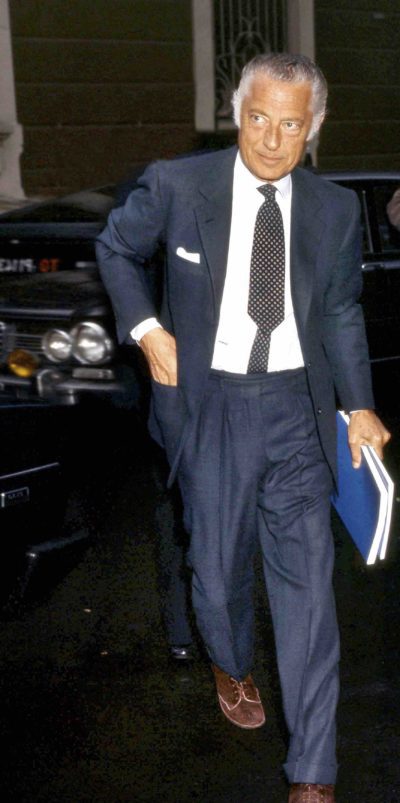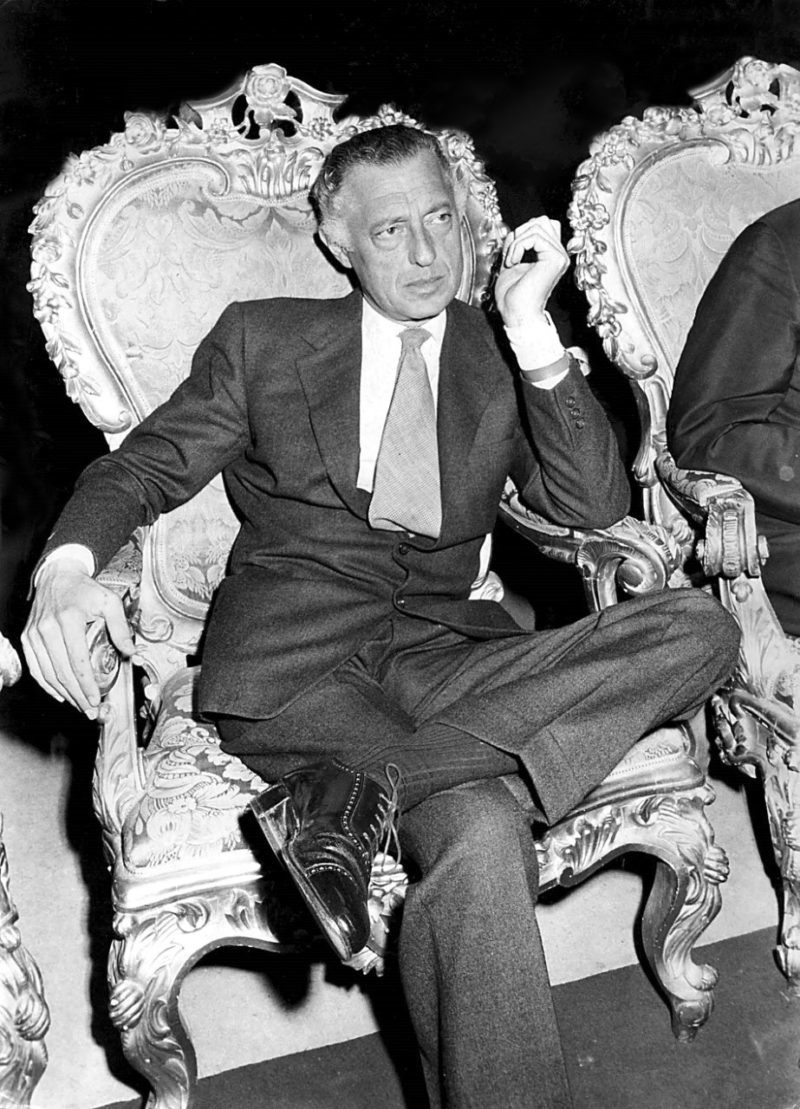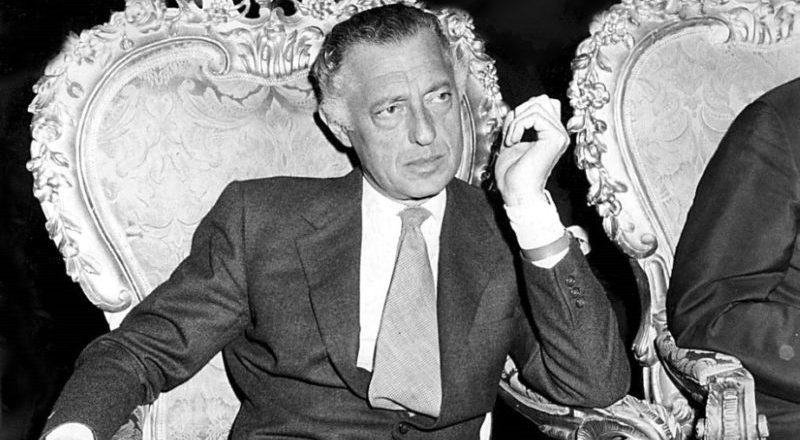INTERVIEW: In new film, Gianni Agnelli comes off as Italian symbol of strength after WWII

For both newcomers and those who know the life and influence of Gianni Agnelli, the new HBO documentary, Agnelli, will be a welcome treat. Nick Hooker’s film, which premieres Monday, Dec. 18 at 8 p.m., looks into the Italian magnate’s great impact on industrialization as the “Father of Fiat” and his playboy personal life, which spanned the 20th century.
However, what audience members may be most surprised about is Agnelli’s influence in Italian governmental affairs in the years following World War II. He would often meet with foreign dignitaries, making the case for outsiders to not give up on Italy and wait out the Communist wave that swept through the European nation.
The film includes archival footage and interviews with a host of characters who knew Agnelli. Included among the talking heads are Henry Kissinger, Valentino, Jackie Rogers, Sally Bedell Smith, Roger Cohen, Jas Gawronski and Agnelli’s niece, Diane von Furstenberg. Jackie Kennedy is also shown.
Hooker became attached to the project after the producer of the film offered a look at a slate of movie options being considered for production. Agnelli immediately interested Hooker, and he signed on board.
“I thought that’s the one I would want to do,” Hooker said in a recent phone interview. “I sort of intuitively knew that I had an instinct that that one would be incredibly rich and would take me to some interesting places. I knew the playboy stuff and the aesthetic and the elegance and the style, all that stuff, and I thought that would be enormous fun to explore and sort of get into. But then I also knew about Fiat. He was an industrialist, which I thought was interesting.”
What truly hooked Hooker was the time period of the 1970s in Agnelli’s life. The director knew that beneath the glamor and style there was darkness, drama and danger. “Primarily, at first, I thought I wanted to do it because I knew it’d be fun, and then I suspected it would be really absorbing and really kind of fascinating,” he said. “And that’s how it turned out.”
Finding the archival footage for the documentary wasn’t difficult, but securing the films that highlighted Agnelli’s iconic nature proved difficult. Many Italian archives are owned by the country itself, and the process to find them and use them was onerous for Hooker.
“Actually getting the archives was really tortuous, so that was one challenge just on a practical level,” he said. “His life was full-on, full-blown, epic drama all the time, so there were episodes and adventures and other aspects of his life that are really, really fascinating that we had to discipline ourselves and not get lost in. That was a real challenge. Also another challenge that I had was how to make a film that an American audience, who doesn’t know much about Italy post-war — they have the vaguest idea of it — that it would be accessible to them. They would understand what was going on without getting completely in the weeds, and that also an Italian audience, when they watched it, would feel that they were learning something new that they hadn’t learned before. That was also a challenge.”

The arc of Agnelli’s life perfectly tracks the major chapter headings of the 20th century in Europe and the West. Besides his pivotal role as chairman of Fiat, Agnelli was an important presence at the time of the Italian Communist Party, one of the largest outside the Soviet Union and China.
“I mean, Italy was the weak link in NATO, the country where there really was a possibility the Italian Communist Party would democratically take power,” Hooker said. “This was Gianni’s fear. Gianni’s conviction was, even if the Italian Communist Party won an election legitimately at the ballot box and came to power, confirming and swearing up and down that they would respect the democratic principle, that there would be another election. The hardcore Stalinist faction within the Communist Party would — in a hop, skip and a jump — be in charge, and then they felt that then they would be out of NATO. They’d be out of the European Union, and they’d be firmly in the Soviet camp.”
Agnelli believed if the Stalinist sympathizers seized control, the results would be disastrous. The Americans, at the time, agreed with this assertion.
“It’s one thing for Southeast Asia to become Communist or countries in Central America or South America to be going Communist, but a country in western Europe, in Italy,” Hooker said. “If the Communist Party in Italy had managed to do that, it would have been a huge signal, a huge motivator for Communist parties in other parts of the world, in Southeast Asia, in South America, etc., in Africa, to rally themselves. So it was very tense. The whole thing was like [Agnelli] was on a tightrope the whole decade, and I didn’t know that when I started.”
As evidence of Agnelli’s influence in Italian governmental affairs, Hooker pointed to Kissinger’s interesting stories. The former secretary of state said that when American diplomats would travel to Italy, they would meet with the Italian prime minister maybe for 10 seconds.
“They knew that the prime minister would probably be gone in six months,” Hooker said. “Every six months there was a new government in Rome, so they wouldn’t waste their time getting too close or too enmeshed with an Italian government because they didn’t know if it would be there in six months. The only person they knew would be there in six months was Gianni, so they’d spend 10 seconds with the prime minister. And then they’d spend the rest of their time huddling with Gianni … who would be telling them not to do anything stupid. I think that was another thing that even Italians I don’t think really fully appreciated. … There were factions within the CIA and the government who really [advocated] to do something drastic to make sure that [Italy] didn’t topple over, whether it was stage a coup, whatever it was, and it was Gianni who relentlessly told them, ‘No, no, no, you have to wait. Be patient. This Communist wave will break. It will fragment. It will dissipate. It’ll lose its force. It just needs to crash and dissipate.’ And that’s what happened.”
Hooker said Italians have not appreciated Agnelli’s role during the 1970s because the “Father of Fiat” was incredibly discreet about his influence.
“I think he was very quiet and very sophisticated in the way he played that game,” Hooker said. “He realized that he had that responsibility, that no one else was going to do it if he didn’t, but it wasn’t going to get in the way of him having a good time. Even though in the film it does feel like in the ‘70s his playboy years were kind of on a hold, that wasn’t strictly the case. It just went underground.”
By John Soltes / Publisher / John@HollywoodSoapbox.com
Agnelli will premiere Monday, Dec. 18 at 8 p.m. on HBO. Click here for more information.


Hard to call it a documentary. Rather one-sided accounts with only family and people who owed their livelihood to him being heard.